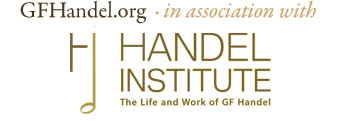Issue 4, Part One: February/March 2002Interview with Paul Nicholson (Keyboardist, The Orchestra of the Age of Enlightenment)Introduction: Paul Nicholson (“PN”) is a well known harpsichordist, and has played continuo in many of Handel’s works. He made a particularly special recording of Handel’s organ concertos for Hyperion, with Roy Goodman and The Brandenburg Consort. He is also a regular member of the Orchestra of the Age of Enlightenment (i.e. the ‘OAE’), and spoke to David Vickers (“DV”) about Handel, and the OAE’s London concert series “Discovering Handel”. DV: What was your first encounter with Handel's music, and how was this later consolidated? PN: I first encountered Handel through my father’s collection of 78 rpm discs. Dr Malcolm Sargent and the Liverpool Phil. with Isobel Baillie singing ‘I know that my Redeemer’ (with piano continuo!) - Dr D.G. Cunningham performing some of the Organ Concertos on the great Birmingham Town Hall instrument (with the Birmingham Municipal Orchestra). They made an impression on me despite their datedness, and inevitably inform the way I think of the music now - even though I would not want to replicate their sound. DV: Do you consider yourself an organist or a
harpsichordist? Are there any differences in your approach to each instrument? DV: What are the particular challenges of playing continuo in Handel's works? Does your approach vary between operas and oratorios? PN: Because Handel was himself a fine improviser and directed his own works from the keyboard, it is clear that the continuo harmony needs to be very bold and defined, particularly in his continuo arias, but also in the many arias scored for unison violins and bass. In more fully scored overtures and arias the role becomes more textural than harmonic, and one needs to be very sensitive to Handel’s highly varied orchestral colours, playing very sparely or on occasions, not at all. These qualities tend to cross between opera and oratorio, although there is much more recitativo to accompany in the operas. DV: What do you think about using the organ as a continuo instrument in operas? PN: Strictly speaking, what we have of Handel’s extant keyboard parts shows us that he himself used the organ mostly in choruses, or in rather showy obligatos (sonata movements or in sung arias). Personally I prefer to keep to that as a rule of thumb, though the odd sublime aria can be very effective with organ as a change from harpsichord or theorbo. Indiscriminate use of both together becomes rather turgid, I think! DV: You've made a fine recording of Organ Concertos for
Hyperion - can you tell me a bit about how this was made? DV: You have also recorded the 8 Harpsichord Suites for Hyperion… PN: The Harpsichord Suites and Voluntaries were recorded on two instruments. One was a modern copy by Bruce Kennedy of a German original by Mietke dating from around 1710, the other an original English harpsichord by Kirckman dated 1778. We felt that the contrast of the two balanced Handel’s Saxon origins with his abiding place in English musical society up to and after his death. DV: What are some of the most memorable Handel projects you've been involved with? PN: All of the Handel performances and recordings I took part in through the 80’s with Sir John Eliot Gardiner were extremely memorable. He is very in tune with the emotional landscape of Handel and the English Baroque Soloists caught the magic of his orchestral colours. During my time as Associate Musical Director of the London Handel Festival in the 90’s I enjoyed directing Handel performances, which included the three versions of Il Trionfo del Tempo, two Italian and one English. Just before last Christmas I joined Harry Christophers and The Sixteen for a tour of Messiah in Spain and thoroughly enjoyed myself! The highlight was actually seeing the joy of amateur Spanish singers who, in a special project, joined with the choir for two performances in Barcelona. They were very well drilled and did extremely well. DV: You are involved with the “Discovering Handel” series with the OAE. What are you looking forward to about that project? PN: The OAE is full of dear friends and musicians for whom I have profound respect. The way the orchestra is set up, it works with a variety of different conductors. I have had very little experience of René Jacobs, and know nothing about Rinaldo Alessandrini. Nicholas McGegan will be very lively and characterful. Yet whatever the perceptions of the audience, inevitably some of these have enabled the players to give their best, and some haven’t - say no more! I’m looking forward very much to the Handel series and know it will be very exciting. DV: I hear that you are going to retire as a musician, and train for the Priesthood. Will you continue to play continuo from time to time? PN: I have in fact been training (part time) for ordination for over 2 years, and will be ordained a deacon in June this year. Once ordained I will work full-time as an assistant curate in the Diocese of London, so I will not be on the professional music circuit any longer. As I prepare for this change of direction I am not especially conscious of ‘any unfulfilled musical ambitions’ (though show me one musician who doesn’t have them!) - rather I’m looking forward to making more full use of other gifts. They’re very different ones of course, but I’m convinced that this is right for me. I first had thoughts of the priesthood in my teens (perish the thought!), but I needed to have some ‘corners knocked off’ before I was ready, so now, here I am.
Unless explicitly specified otherwise, this page and all other pages at this site are Copyright © 2015 by David Vickers and Matthew Gardner Last updated: August 30, 2020 · Site design: Duncan Fielden, Matthew Gardner and David Vickers |

